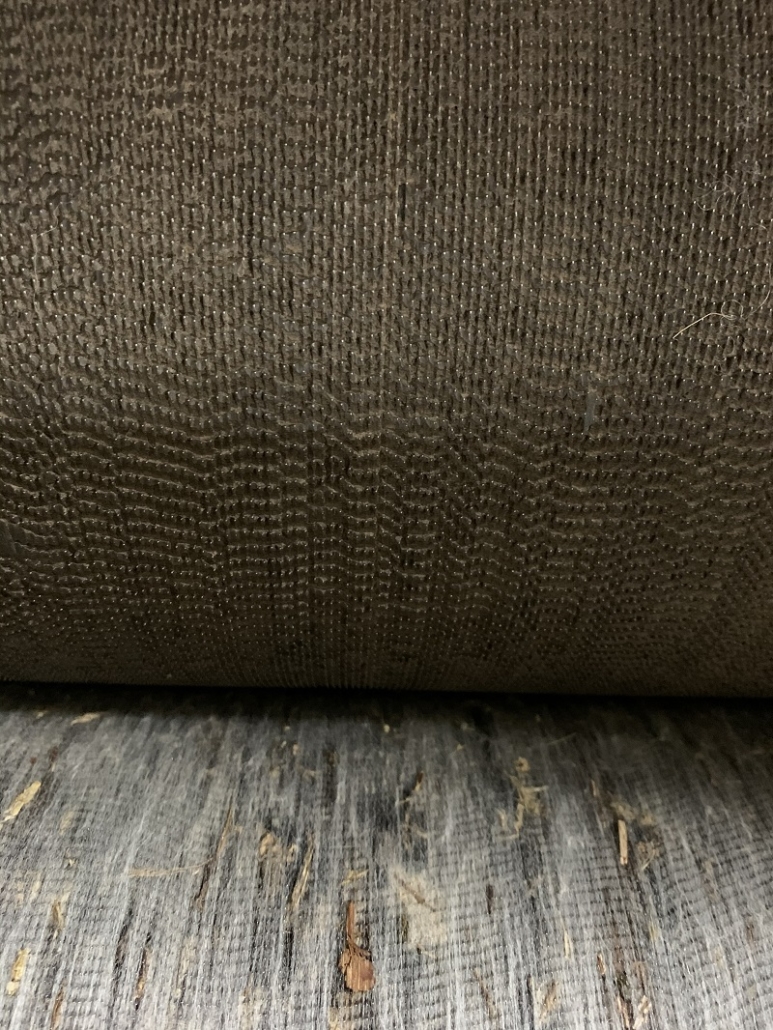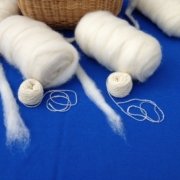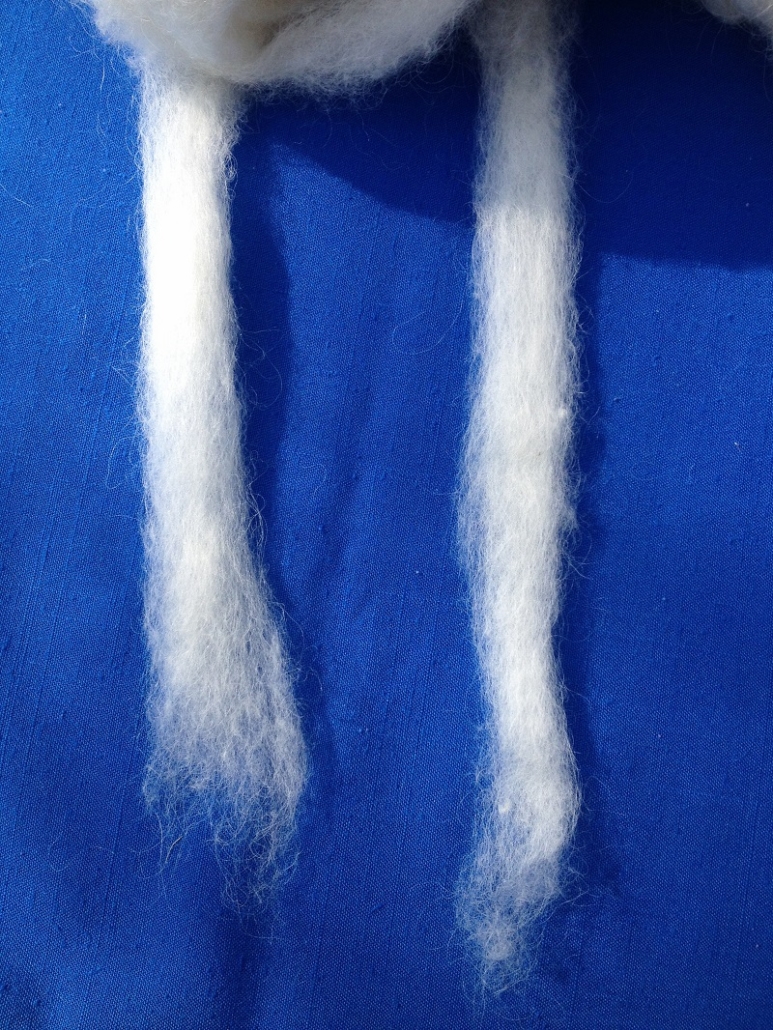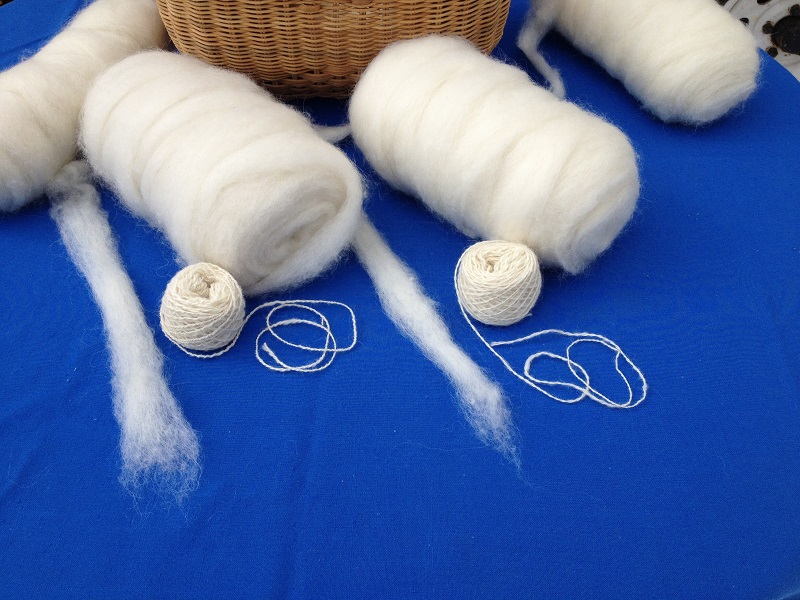Sending double-coated fleece to a fiber mill
words and photos by Terri Louise
Although some spinners really enjoy processing an entire raw fleece from start to finish, not everyone has the desire, or the facilities, to handle the initial prep work. A fiber mill can turn a raw fleece into soft, spinnable roving – but double-coated fiber has some special challenges. Here’s what to ask before you send a double-coated fleece to a mill.
Some of the basic questions apply to any fiber sent for processing – what is the mill’s pricing structure, do they have a minimum weight requirement, and what services do they offer? Virtually any mill can wash, pick, and card wool into roving. If you have a preference (such as bumps), find out in what finished form their roving comes.
For a double-coated fleece, the most important question is if the mill can handle the fiber length. The outercoat on some breeds can be 15 inches or longer. Not all mill equipment can deal with that length. Others may have an extra charge for hand-feeding long fiber into the equipment (this does not necessarily make the total processing more expensive).
If you want roving that combines the two coats, many mills are capable of doing that. I have sent Icelandic lamb fleece to Ohio Valley Natural Fibers several times and have gotten back lovely roving. The combined coats of lamb or adult can be softly spun for a lopi-style singles yarn or spun and plied various ways. But some processors have the machinery for an additional service: dehairing.

Dehairing machines were developed for removing the coarser guard hairs from fibers such as cashmere, alpaca, and bison. A series of rollers with different textures separate out the finer, more desirable undercoat. Double-coated sheep breeds can benefit from this option as well.
Carrie, owner of America’s Natural Fiberworks, said a dehairing machine has another advantage. Although the best results always come from sending good-quality, well-skirted fiber, the reality is that many fleeces have a fair bit of VM (vegetable matter) and second cuts. A dehairing machine will take out quite a bit of both of those undesirable items.
Should you have your double-coated fleece dehaired? For an adult fleece, this will give you two distinctly different rovings – wonderfully soft undercoat and the coarser outercoat. Carrie said clients often get the outercoat made into sturdy core-spun rug yarn, but it can also be returned loose or as roving. Be sure to specify your choice from among your mill’s available options.
For a lamb fleece, the difference between the under and outer coats is not as pronounced, and dehairing will remove little of the outercoat. However, if your lamb fleece has VM or second cuts, dehairing will improve the final result.
As a comparison, I sent 6 pounds of Icelandic lamb fleece to America’s Natural Fiberworks. I had half of it dehaired and half processed normally. The result – dehairing lamb fleece made only a minor difference (granted, it had nearly zero VM or second cuts). The non-dehaired fiber had a 68% yield versus a 65.5% yield for the dehaired fiber. This meant the dehairing machine removed less than 2 ounces of fiber out of 3 pounds. The spinners who sampled both the dehaired and non-dehaired lamb roving did not consistently find an obvious difference – they liked it all!
Fiber mills are a great resource for those who want, or need, their services. If you have a double-coated fleece that needs processed, ask a few extra questions to make sure the mill can handle your fiber. Dehairing is an additional option that may be suitable for the results you want. Let the mill do the prep work – then enjoy the spinning!
In 2013, Terri Louise got two pregnant Icelandic sheep off Craigslist, and discovered the fiber community. She loves caring for the sheep, working with their fiber, and the fact that there is always more to learn. Follow their adventures at Spotted Sheep Farm.
Did you know we also have a monthly PLY newsletter? Sign up here!
PLY Magazine believes that Black lives matter, as well as LBGTQI+ lives. Those most vulnerable and persecuted in our communities deserve our love and support. Please be good to each other.







Leave a Reply
Want to join the discussion?Feel free to contribute!